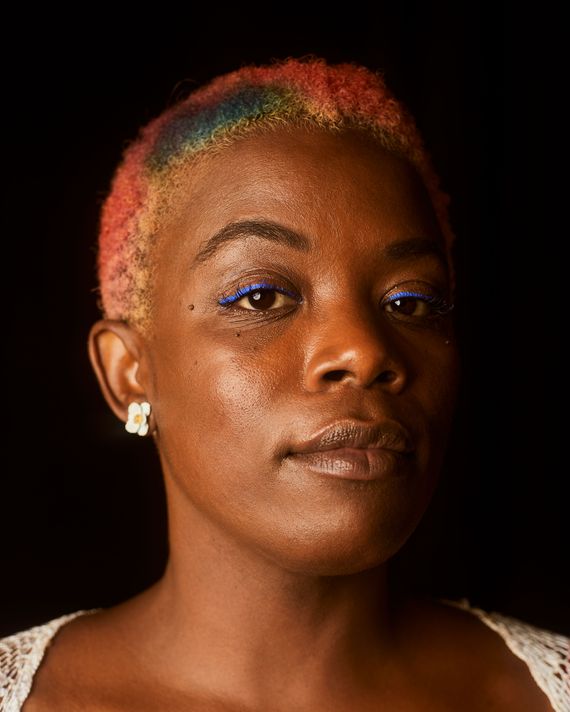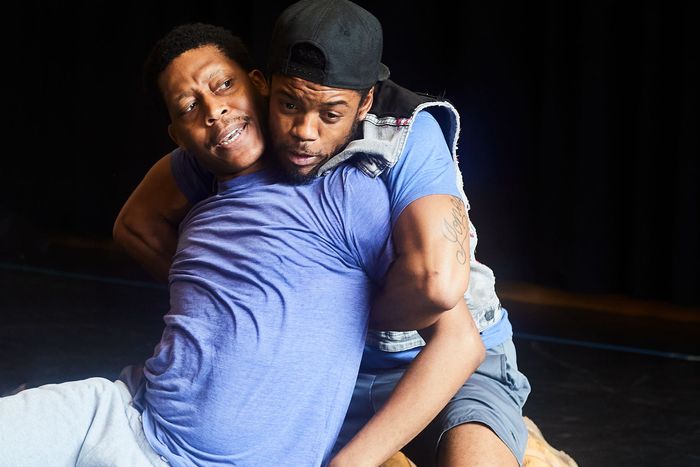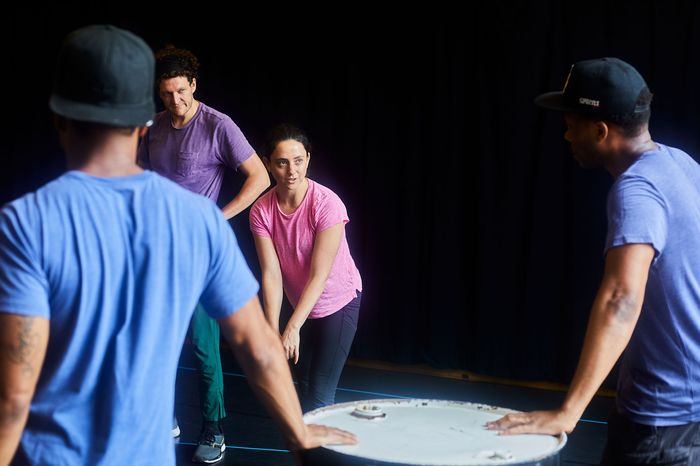
At the first rehearsal for what will be the first play to open on Broadway since the start of the pandemic, the team members of Pass Over are gathered in a midtown dance studio psyching themselves up. Director Danya Taymor kicks things off with a speech: It’s been three years since the Off Broadway run, and many of them are returning from that production. They’ve always done the play in the summer, she points out, and always during the NBA Finals. “So we’re right in the pocket,” she says. “This project always attracts what it needs and always gives us just enough time to do it.”
“Oh, does it!” interjects Antoinette Chinonye Nwandu, Pass Over’s playwright and producer, looking up from her Sweetgreen salad. There’s laughter. They have a whole lot to do this time around. After all, Nwandu is changing the play’s ending.
This first rehearsal is on July 7; on August 4, Pass Over will start previews at the August Wilson Theatre in its — and Nwandu’s — Broadway debut. The show, which Nwandu has staged in different iterations since 2016, tells the story of two Black men on a street corner, blending the clowning humor of Waiting for Godot with the biblical tale of Exodus and requiring only three actors — an advantage at a time when the entire cast and crew need to spit into vials for COVID-19 testing every few days. Moses (Jon Michael Hill) and Kitch (Namir Smallwood) entertain themselves with wordplay and games and talk about a promised land to which they might “pass over,” if and when they can leave the corner. Preventing that journey are two versions of whiteness, both played by Gabriel Ebert, that descend upon them: the upper-middle-class Mister, who condescends to tell them to stop using the N-word, and the menacing Ossifer, a policeman. In previous versions of the play, Moses and Kitch never make it to the promised land — just when it starts to seem possible, Moses is shot.
This time around, though, Nwandu doesn’t want the story to build to the shock of Moses’s death but to emphasize the two characters’ hope and playfulness. “I just want everyone’s humanity to take up more time,” Nwandu tells the cast and crew. In these early rehearsals, the new version of the script doesn’t exist yet; the plan is to work through it in the room, teasing out where the actors — who played the same roles Off Broadway — can modify their performances now that both protagonists will survive. In their first read-through, with fans humming in the corners to circulate air, they revisit the 2018 version. “In the second act, I’m trying to find joy,” says Hill afterward, “but it is what it is.”
Playwrights often hone their scripts when their shows move to midtown. It’s rarer to revise with an eye to the current historical moment. After living through 2020, Nwandu decided she did not want to spend her time “rehearsing a play about a lynching,” did not want to put more death onstage. Her revisions aren’t the only result of last year’s upheaval. Although this production of Pass Over was in talks before COVID, it will now be joined on Broadway by six other new plays by Black playwrights — likely a response to the demands of BIPOC theater artists who last summer called for the then-shut-down theater industry to confront its systemic racism, commit to better representation onstage, and put more BIPOC in positions of power.
But Nwandu is also responding to a transformation in her personal life. She found out she was pregnant in spring 2020, shortly after Broadway went on lockdown, then had a miscarriage that July, during her second trimester. This spring, her marriage ended. She is rehearsing the play as she looks for a new home for herself — returning to the material hoping to remake it, herself, and the theater as a whole. “I’m hopeful, but …” Nwandu says of the last, then laughs. “I’m also a Black woman in America.”
The writer, 41, grew up in Los Angeles, where she and her mother were part of what she calls “a very charismatic Evangelical cult” that imbued in her a bone-deep relationship to the Scriptures. They got out when she was a young teen, and Nwandu won a scholarship to the private Brentwood School, which set her on a path to Harvard — where she wrote her undergraduate thesis on Samuel Beckett’s novels — and, eventually, to two master’s programs, one in philosophy at the University of Edinburgh and one in playwriting at NYU, inching through academia toward a career in the theater.
She started working on what would become Pass Over while teaching public speaking at the Borough of Manhattan Community College, toying with an idea built around the story of Moses, one of her favorite Bible tales, with characters who spoke like her students. In 2013, she saved up to see the Broadway production of Waiting for Godot with Patrick Stewart and Ian McKellen — as she puts it, the “crème de la crème.”
“Then I remember having this really shitty thought,” she says. “When Beckett wrote this play, it represented the height of white western anxiety — the fact that these two men might be abandoned by God. It’s a terrible, existential feeling. But I looked up at them, and I was like, Wait, but they still get to be old. If they were Black, these characters wouldn’t be old.” She realized the Exodus-inspired play she was working on could respond to this too.
She first developed a version of Pass Over for audiences at the Cherry Lane Theatre in 2016, with the two characters playing Beckett-like games while in fear of distant police sirens. Taymor joined the play in 2017, when it went to Chicago’s Steppenwolf Theatre and attracted the attention of Spike Lee, who made a filmed version for Amazon Prime. (He would invite Nwandu into the writers’ room for his Netflix series She’s Gotta Have It — her first TV gig.) The show kept evolving: Nwandu rewrote Pass Over again before its 2018 Off Broadway run at Lincoln Center Theater, “taking it from a sledgehammer to a shiv”: It now ended with Mister bemoaning the fact that Black men keep getting murdered and he, a nice liberal white man, can’t do anything to help them. “This is a white, possibly Jewish, audience. They didn’t vote for Trump,” Nwandu says. “That ending pokes these people in the ribs.”
The discussions about bringing Pass Over to Broadway began in February 2020. In the year that followed — after her miscarriage stranded her in isolation in a COVID ward — Nwandu felt her creative priorities for the play realign away from simply confronting a white audience. She set a goal for herself to imagine a version of the play that could do without Moses’s death and avoid retraumatizing Black audiences. She compares it to a New Testament version of the script, where divine redemption is hard-won but possible. “I want to offer an ending that will help heal people,” she says, “and will help bring joy and beauty and laughter and a little bit of grace and a little bit of Afrofuturism to any audience member, regardless of their race.”
This past March, as she celebrated her birthday over drinks, she had a conversation with Jeremy O. Harris — who took a producer role for his own Broadway breakout, Slave Play — about her own decision to be a producer on Pass Over. Nwandu says Harris offered her a ’shroom-laced chocolate bar; the birthday (and the trip) aligned with her sense that she needed to take more control. “I had an energetic change,” she says. “Out with the old, in with the new.”
That feeling reverberated outward. As she prepared to return to the stage, her marriage to theater director Graham Schmidt fell apart because, she says, he was jealous of her success and unable to handle her newfound confidence. Since then, she has been baring it all on social media, mixing updates on the play with straight-to-camera briefings on her divorce, dyeing her hair blue and pink and coming out as (in her words) “bi-curious/questioning.” (New York magazine was unable to reach Schmidt for comment before publication. After this story was published, he contacted New York to provide a statement saying “there are two sides to every story,” but declined to offer specifics.)
“Even though I had left the church, there was still a part of me that was trying to fit into a heteronormative box,” she says now. “And I’m like, Fuck that heteronormative box. I’m bicurious. I’m going to be a single mom. Like Angelina Jolie when she had just adopted Maddox” — she laughs — “I want to be like that. But, you know, my version of that.” To her, this openness is part of a commitment to her new artistic vision: “If I say I want to write a play about healing, I have to be honest about my own healing and my own trauma.”
Once the production began to ready plans for Broadway, Nwandu knew she had to change the ending. Taymor tells me her first response to Nwandu’s plan was “Absolutely.” “I always say Antoinette has the prophecies,” the director says. “She can see the things we don’t see yet.”
So they set off with a new goal for their play: to imagine happiness for Moses and Kitch and to offer it to their audiences. Nwandu is also hoping to change who those audiences are. After Slave Play’s success with ticket discounts and outreach to young New Yorkers of color, she is pushing for similar initiatives. She also intends to keep the earlier versions of Pass Over available for licensing just in case theater companies feel the need for confrontation. “If your town is infested with MAGA people,” she says, “then yes, please produce Pass Over 2017.”
When I come back to rehearsal on July 15, the company is hard at work in search of exuberance. Taymor begins rehearsal with an hour of physical warm-ups, including yoga and mirroring exercises, set to a playlist that includes “WAP” and “Montero (Call Me by Your Name).” The actor and Beckett expert Bill Irwin has stopped by today; he enthusiastically participates in the warm-ups, but Nwandu drops in for just a few poses before backing out. “I don’t like all this sweat and vulnerability,” she says. After a group improv session — and a reminder for everyone to sanitize their hands from the COVID safety manager, a new kind of crew member—they launch into a run-through of the play on its feet, including some of Nwandu’s latest rewrites.
Nwandu, Taymor, and set designer Wilson Chin are devising new elements for the set — “This is where we’re spending all the money,” Nwandu jokes — and a collection of images is posted on a wall, a thematic mood board: the 2015 Time cover with Devin Allen’s photograph of a Baltimore protester taken after the death of Freddie Gray, silhouette drawings by artist Kara Walker, Henri Rousseau’s paintings of a jungle paradise. Taymor and Nwandu are always sending each other inspiration, whether it’s Shakespeare’s The Winter’s Tale or My Fair Lady, which they saw at Lincoln Center while high and became convinced was the white-woman version of Pass Over. (Both are about characters trying to change their language to move up in the world; both include streetlights in their sets.) They’re trying to pull their fields of reference together. “We’re aware of our racial and class backgrounds,” Nwandu says. “The constant communication is a mind meld and a check-in: Are you saying what I’m saying?”
As one of their rehearsals winds down, Taymor and Nwandu huddle with Smallwood, Hill, and Ebert, gathering feedback and probing for which parts of the material feel good and which aren’t clicking. Taymor asks what’s on everyone’s mind, and Smallwood says he is thinking about what it will be like to perform the play for audiences in the August Wilson Theatre specifically — the first play by a Black playwright to open there since the theater’s name was changed. “That’s joy for me,” he says.
That’s what all this is arcing toward: being together in that space and giving audience members something that could change them. “I do didactic work,” Nwandu says. “I’m going to give you something to think about.” She has already suggested bringing actors dressed as healers from various faiths to the August Wilson’s lobby to cleanse the spectators as they enter. This is unlikely to happen — and Pass Over has enough health-and-safety concerns already — but Nwandu’s intention is serious. When her family was in a cult, she saw people become seemingly possessed under the power of group delusion, vomiting so that demons would be taken out of them.
“I don’t think of myself as an Evangelist, but I cannot divorce myself from the sensibility that when human beings get together, they can create a certain alchemical space that invites the higher self. Our relationship to the world needs to be healed,” she says. “My small part is to create a work of art that will give you the space to begin that inner healing.”
This story has been updated to include a statement from Graham Schmidt.




